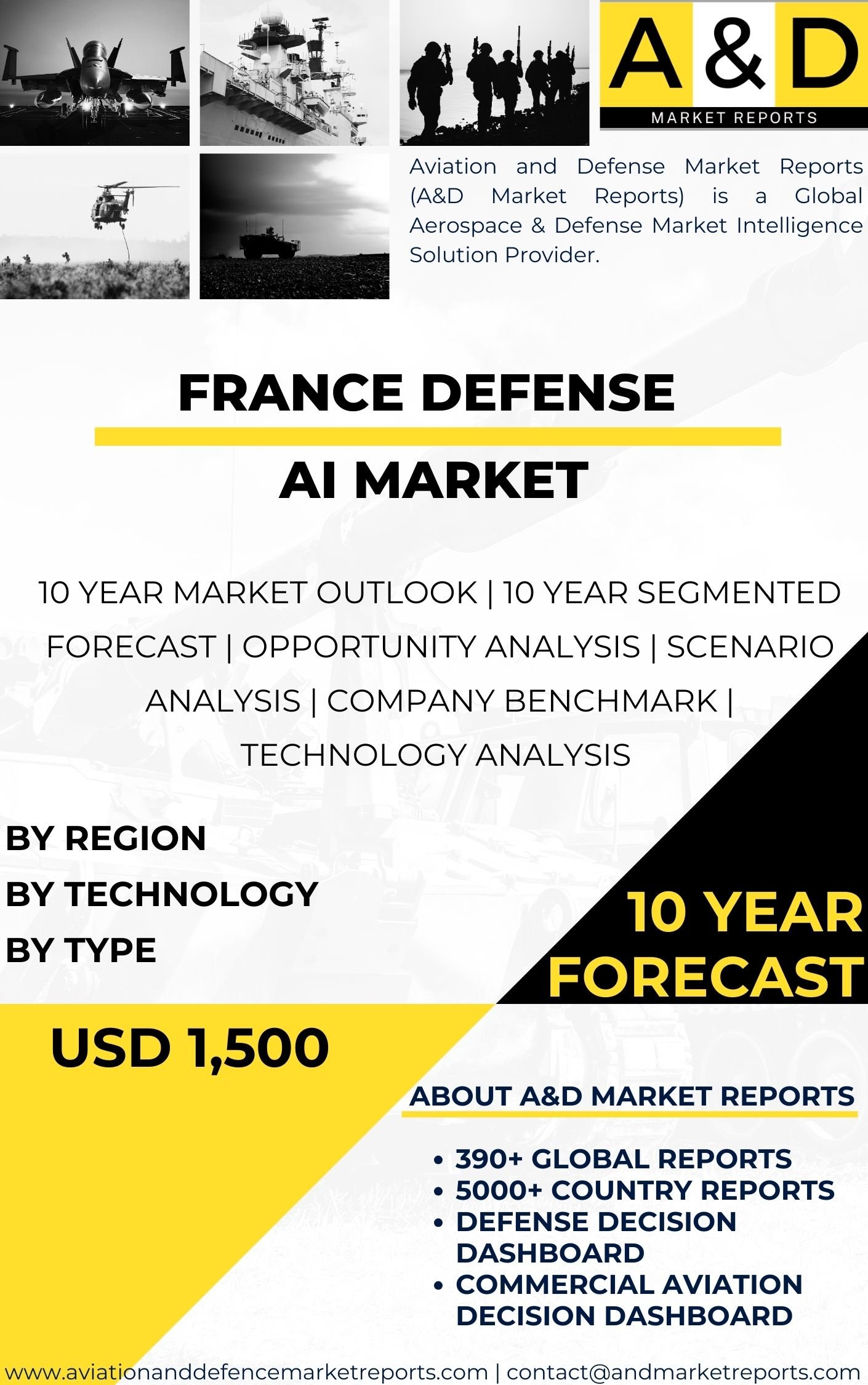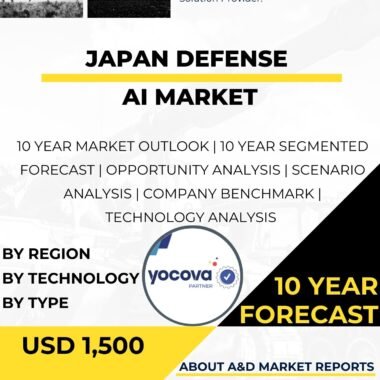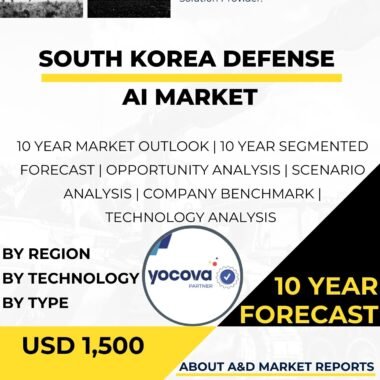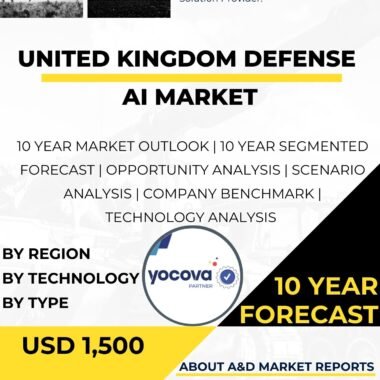Description
Overview of France’s Defense AI Market
The France Defense AI Market is a rapidly evolving and critical segment of the country’s defense industry, propelled by advancements in artificial intelligence (AI) and machine learning technologies. AI has emerged as a transformative force in modern warfare, enabling more efficient decision-making, autonomous systems, and enhanced data analysis. France has been actively investing in AI capabilities to improve situational awareness, optimize logistics, and bolster national security. The integration of AI across multiple defense platforms—from aircraft and naval vessels to cyber operations—reflects the growing reliance on smart technologies to maintain a strategic edge in an increasingly complex global security environment.
Significance of AI in Defense Operations
The significance of France’s defense AI market lies in its potential to revolutionize military operations and strengthen national defense capabilities. AI technologies can process vast amounts of data and extract actionable insights, enabling faster and more informed decision-making on the battlefield. Autonomous systems powered by AI reduce the risk to human personnel in dangerous environments and improve operational efficiency. Additionally, AI can enhance predictive capabilities, providing commanders with real-time information that supports strategic planning, rapid threat response, and optimized resource allocation across diverse operational theaters.
Key Players and Industry Stakeholders
The market involves government research institutions, private defense firms, and AI technology providers. The French Ministry of Armed Forces leads AI development through its R&D agencies. Major companies such as Thales, Safran, and Dassault Aviation integrate AI into their defense systems. They develop autonomous vehicles, predictive maintenance tools, and advanced sensor platforms. Moreover, partnerships with universities and research labs accelerate innovation. Consequently, France has a strong ecosystem for AI in defense.
Technological Advancements in Defense AI
Technological breakthroughs are shaping France’s AI market. Advances in machine learning, computer vision, and neural networks have expanded AI applications. For instance, predictive analytics and anomaly detection enhance autonomous decision-making. In addition, AI algorithms can process data from satellites, drones, and IoT devices. This improves situational awareness and enables automated threat detection. Furthermore, AI supports faster and more accurate responses to emerging threats.
Applications in Intelligence, Surveillance, and Reconnaissance (ISR)
AI is critical for ISR operations. It analyzes data from satellites, UAVs, and other sensors to detect potential threats. Moreover, AI identifies patterns and delivers real-time situational awareness. This reduces human workload while improving accuracy. Consequently, AI allows faster and more effective intelligence gathering. In addition, it helps commanders make informed operational decisions quickly.
Role in Cyber Defense
AI strengthens France’s cyber defense capabilities. AI-driven systems detect and respond to threats in real time. They identify malicious activity patterns and predict cyberattacks. Furthermore, these systems can act autonomously to mitigate risks. As cyber threats evolve, AI becomes essential to protect military networks. Additionally, AI reduces downtime and prevents disruptions to critical defense infrastructure.
Applications in Autonomous Systems
Autonomous platforms rely heavily on AI. UAVs, UGVs, and autonomous vessels use AI for navigation and mission execution. They adapt to complex and changing environments with minimal human input. Moreover, AI algorithms manage targeting, path planning, and operational decisions. Consequently, autonomous systems enhance effectiveness while reducing risks to personnel. Additionally, AI integration ensures coordinated operations across multiple platforms.
Predictive Maintenance and Operational Efficiency
AI also improves predictive maintenance. It analyzes equipment data to forecast failures and optimize schedules. Therefore, defense platforms experience less downtime and higher readiness. Furthermore, predictive maintenance reduces overall costs. It ensures that aircraft, vehicles, and ships remain mission-ready. This improves efficiency and extends the lifespan of expensive systems.
Natural Language Processing and Human-Machine Interaction
Natural language processing (NLP) enhances human-machine interaction. Soldiers can communicate with AI systems using voice commands or text. Moreover, NLP improves usability and reduces errors in high-pressure scenarios. Consequently, AI systems become more intuitive and efficient. This technology also streamlines command-and-control processes across defense platforms.
Policy and Ethical Considerations
Policy and ethics guide France’s defense AI market. The country follows international guidelines for safe AI development. Additionally, national policies prioritize research, innovation, and investment in AI technologies. Ethical use of autonomous systems is emphasized to comply with international humanitarian law. Moreover, France supports collaboration between government, academia, and industry. This ensures AI technologies are safe, secure, and accountable.
Future Growth and Market Prospects
The future of France’s defense AI market is promising. As AI technologies advance, their applications will expand further. Demand for autonomous systems, cybersecurity solutions, and predictive analytics is expected to grow. Moreover, emerging research in explainable AI and resilient algorithms will enhance performance. Consequently, France can maintain its strategic advantage in defense operations.
Challenges and Technical Considerations
Despite opportunities, challenges remain. Continuous R&D is required to keep pace with evolving technologies. Ensuring reliability and cybersecurity of AI systems is critical. In addition, integrating AI with legacy platforms can be complex. Furthermore, balancing autonomy with human oversight is essential for ethical compliance and operational control.
Strategic Focus on Innovation and Collaboration
France’s AI market must focus on continuous innovation. Research in advanced algorithms, predictive analytics, and autonomous navigation is crucial. Collaboration between government, academia, and private industry accelerates development. Additionally, human-machine interaction and AI usability are key focus areas. Consequently, France can create reliable and efficient AI systems for defense applications.
Conclusion: Transforming Defense Capabilities
France’s defense AI market is transforming the national defense ecosystem. Strong government support, private sector innovation, and international collaboration enhance military capabilities. Furthermore, AI improves situational awareness, autonomous operations, and operational efficiency. By investing in R&D, ethical governance, and system integration, France can maintain global leadership in defense AI. This ensures superior technology, reduced risks, and enhanced military readiness.




